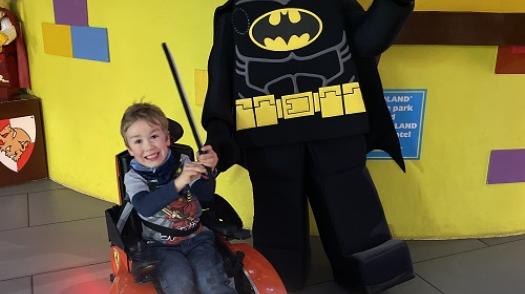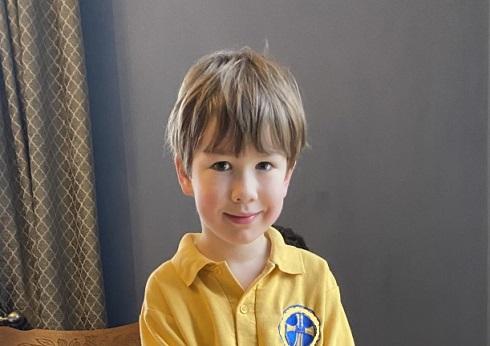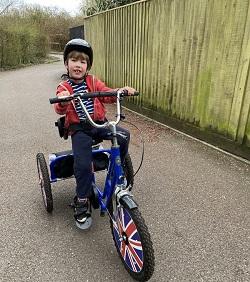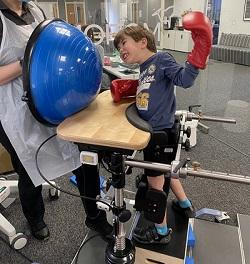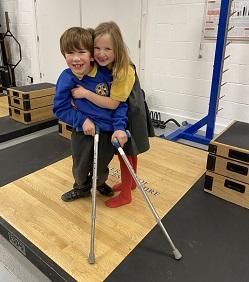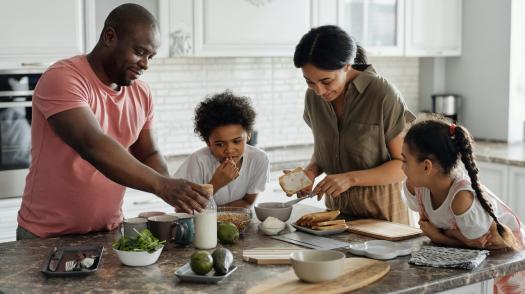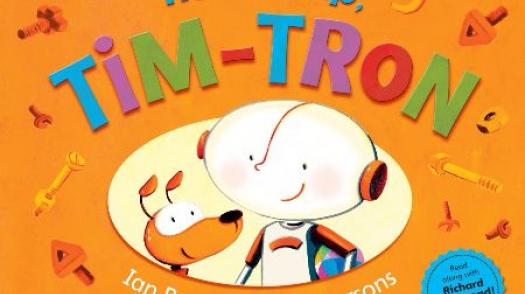Published: May 2021
Sebby has an undiagnosed gross disorder with physical symptoms similar to cerebral palsy. After many tears and searching for so long, we have come to accept a diagnosis will not make his life any easier, and that he will always be disabled.
Accepting that was hard. However, we have transitioned from trying to find what is causing the disability, to focusing on positives by searching for how to help his mobility as much as possible through surgeries (six in total) and therapies (multiple sessions a week). I blogged about this last year.
A large focus of ours is how Sebby can be included socially, at school, with friends and within society. Sebby mainly uses a wheelchair or race runner (think a trike with no pedals, he moves it by running while it supports him), but can walk short distances with sticks.
As a parent of a disabled child, one of the things that frustrates me most is that everything is either a fight, or harder than for those who are able bodied. Every. Single. Thing.
Simple things, like: finding wellies that stay on, or a bike he can ride, having a car big enough for his wheelchair, or my mother-in-law sewing small squares of duvet into his trousers to prevent his knees being red raw by the end of the day, because normal kneepads slide down when he crawls!
We never go away for holiday; it’s always for intensive therapy, which Sebby has complained about and said we should just go on a holiday – I agree!
Challenges at school
To more important struggles: Sebby needs a one-to-one carer at his mainstream school, as he needs help constantly throughout the day. However, the council tried to cap her at 15 hours a week. Emails were ignored and our concerns were pushed aside. We were left with no option but to turn a meeting with the council representative fairly hostile, and bring in everyone that supported him to emphasise he needed the full time assistance.
Ultimately, it was resolved after months of pushing, but it was a frustrating use of negative energy, when the outcome was always obvious. If we hadn’t fought, he would have been stuck with inadequate support. His one-to-one supporter is amazing, he loves her, and his school experience would be very different without her.
His school is wonderfully supportive. But he adds work for them, such as a separate risk assessment just for him, or changing the parking for us. When Sebby’s one-to-one carer is ill, they have to work out a schedule with other staff who are trained to handle him and take him to the toilet. He loves school, his friends, his teachers, and loves being there. But everything he does, and all the extra equipment involved (he has his own toilet, what a privilege!), highlights that he is physically different, and creates work for the school.
Sports, hobbies and friendships
Finding sports or activities that can accommodate Sebby locally is hard, we drive 45 minutes each way multiple times a week to get to the nearest available sport such as disabled tennis, race running, football etc, this is something that’s on the doorstep for able bodied families.
Sebby tried joining Beavers, but despite their best effort, he wouldn’t have been able to stay without me helping him. I came back in tears (after he’d gone to bed so he didn’t see!) as it had highlighted how different he was. Then he was upset when we said it wasn’t safe for him to continue to go.
Playing with his friends is different; we can’t meet in the park or go a walk in the woods like others would do. We have to tell the other kids not to run off and do what they would do on a normal playdate, as it leaves Sebby isolated.
If Sebby wants a playdate, I either have to be there or the parent has to know him well enough to feel comfortable lifting him or taking him to the toilet. The older and heavier he gets, the more challenging our lives will become. It will be harder to lift him unless he becomes more independent, which we are not clear on at the moment.
Campaigning against the discrimination that disabled people face
Since we had a bad experience last year, we have become active campaigners to end such discrimination and break down barriers that families like ours face.
In 2020, as a treat for four operations in seven months, we took Sebby and his sister Lottie to Legoland. I had spoken to two different departments prior to arrival and another one when we were arrived, yet no one had prepared us for the surprising discrimination he faced.
Sebby was told to leave his wheelchair and take three steps holding onto just one of our hands before being able to access his favourite ride – all in front of the waiting queue – then told to repeat the process. We were appalled, and this treatment continued on other rides throughout our trip.
We decided to leave his wheelchair in the buggy park and put him on our shoulders for one ride - that ride he was not asked to take the steps! The conclusion from that is if you don’t look disabled, you aren’t challenged.
After posting about it on our Facebook page, Sebby’s Adventure, we were overwhelmed with how many other people have faced similar experiences at a variety of leisure venues. We felt we needed to take action, and after speaking with our MP, Siobhan Bailey, we set up a Change.org page to highlight the everyday discrimination that disabled people face by companies.
We also hired Chris Fry, a specialist disabilities solicitor, to speak to Legoland and see if we could bring about a positive change. What has been wonderful is, after initially getting nowhere with Legoland, they have accepted change needed to be made and very much embraced making these changes.
They have already made many changes to make the Legoland experience more enjoyable and inclusive for children who visit and have committed to necessary changes in the future. It has been a wonderful journey for us, to know we have helped other families in the same situation as we are in.
The positives among the hardships
I have spoken of the difficulties Sebby’s disability brings to everyday life, but I want to end on a positive.
We have met so many wonderful people, from Sebby’s one-to-one, other disabled families, a strength trainer that gives up his time, his therapists and many kind people that support him physically and emotionally.
Our families are fantastic and we’re lucky to have so many positive and supportive friends; all are able to look beyond Sebby’s disability and love him for who he is.
Friends have said knowing Sebby gives them and their children a broader understanding and acceptance of disabilities. Because of Sebby, one of his friends was confident enough to ask a man why he had no hair, and this person was thrilled the child had not just stared, so explained about alopecia.
Lottie, Sebby’s sister, is an incredible person and amazing sister; through having to help him she’s learnt kindness and compassion well beyond her years, and is fiercely protective over him. Sebby is the happiest kid; he’s so funny, cheerful and loves telling terrible jokes!
Yes it’s hard, but we are lucky to have him and Lottie, and despite the hardships, we spend a lot of time laughing.
